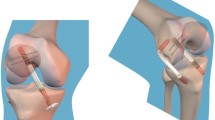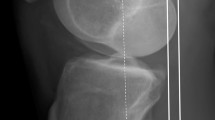Abstract
Purpose
Benefits of an early reconstruction and the optimal time lapse between injury and surgery to reduce the effects of altered kinematics in ACL-deficient knees are still controversial.
Aim
The aim of this study was to clarify, through a quantitative in vivo evaluation, the effects of the time lapse between ACL injury and surgery in terms of changes in the pre-operative knee laxity.
Methods
An in vivo study was performed on 99 patients who underwent ACL surgery. Just before the graft fixation, six laxity tests were performed for all the subjects at manual-maximum load: anterior–posterior displacement and internal–external rotation at 30° and 90° of knee flexion (AP30, AP90, IE30, IE90) as well as varus–valgus rotation (VV0, VV30) at 0° and 30° of flexion. Kinematics data were acquired by a navigation system. The Spearman rank correlation was used to assess correlation between rank and continuous data. Significance was set at P = 0.05.
Results
The analysis highlighted a significant influence of the injury-to-surgery time lapse on VV0 and AP90 compared with pre-operative laxity levels. Meniscus status also significantly affected the pre-operative laxity in the VV0 (Spearman's ρ = 0.203, P = 0.038; GLM with meniscal correction partial η = 0.27, P = 0.007) and AP90 (Spearman's ρ = 0.329, P = 0.001; GLM with meniscal correction partial η = 0.318, P = 0.017) tests.
Conclusion
The main finding of this study is that patients with ACL rupture and a higher injury-to-surgery time present higher values of knee laxity involving AP90 displacement and VV30 rotation. Clinical relevance of the study is that ACL-deficient joint laxity, involving anterior–posterior displacement at 90° of knee flexion and varus–valgus rotation at 0° of flexion, is significantly affected by the lapse of injury-to-surgery time. This highlights the importance of considering the effects of delaying surgery when managing patients with such deficiency.


Similar content being viewed by others
References
Andernord D, Karlsson J, Musahl V, Bhandari M, Fu FH, Samuelsson K (2013) Timing of surgery of the anterior cruciate ligament. Arthroscopy 29(11):1863–1871
Andriacchi TP, Koo S, Scanlan SF (2009) Gait mechanics influence healthy cartilage morphology and osteoarthritis of the knee. J Bone Joint Surg Am 91(Suppl 1):95–101
Chen CT, Burton-Wurster N, Lust G, Bank RA, Tekoppele JM (1999) Compositional and metabolic changes in damaged cartilage are peak-stress, stress-rate, and loading-duration dependent. J Orthop Res 17(6):870–879
Chen J, Gu A, Jiang H, Zhang W, Yu X (2015) A comparison of acute and chronic anterior cruciate ligament reconstruction using LARS artificial ligaments: a randomized prospective study with a 5-year follow-up. Arch Orthop Trauma Surg 135(1):95–102
Cipolla M, Scala A, Gianni E, Puddu G (1995) Different patterns of meniscal tears in acute anterior cruciate ligament (ACL) ruptures and in chronic ACL-deficient knees. Classification, staging and timing of treatment. Knee Surg Sports Traumatol Arthrosc 3(3):130–134
Desai N, Björnsson H, Musahl V, Bhandari M, Petzold M, Fu FH, Samuelsson K (2014) Anatomic single- versus double-bundle ACL reconstruction: a meta-analysis. Knee Surg Sports Traumatol Arthrosc 22(5):1009–1023
Dürselen L, Vögele S, Seitz AM, Ignatius A, Friederich NF, Bauer G, Majewski M (2011) Anterior knee laxity increases gapping of posterior horn medial meniscal tears. Am J Sports Med 39(8):1749–1755
Fithian DC, Paxton LW, Goltz DH (2002) Fate of the anterior cruciate ligament-injured knee. Orthop Clin North Am 33(4):621–636
Fu FH, Harner CD, Johnson DL, Miller MD, Woo SL (1994) Biomechanics of knee ligaments: basic concepts and clinical application. Instr Course Lect 43:137–148
Goradia VK, Grana WA (2001) A comparison of outcomes at 2 to 6 years after acute and chronic anterior cruciate ligament reconstructions using hamstring tendon grafts. Arthroscopy 17(4):383–392
Griffith CJ, Wijdicks CA, Goerke U, Michaeli S, Ellermann J, LaPrade RF (2011) Outcomes of untreated posterolateral knee injuries: an in vivo canine model. Knee Surg Sports Traumatol Arthrosc 19(7):1192–1197
Grood ES, Suntay WJ (1983) A joint coordinate system for the clinical description of three-dimensional motions: application to the knee. J Biomech Eng 105(2):136–144
Heijink A, Gomoll AH, Madry H, Drobnič M, Filardo G, Espregueira-Mendes J, Van Dijk CN (2012) Biomechanical considerations in the pathogenesis of osteoarthritis of the knee. Knee Surg Sports Traumatol Arthrosc 20(3):423–435
Keene GC, Bickerstaff D, Rae PJ, Paterson RS (1993) The natural history of meniscal tears in anterior cruciate ligament insufficiency. Am J Sports Med 21(5):672–679
Lohmander LS, Englund PM, Dahl LL, Roos EM (2007) The long-term consequence of anterior cruciate ligament and meniscus injuries: osteoarthritis. Am J Sports Med 35(10):1756–1769
Lohmander LS, Ostenberg A, Englund M, Roos H (2004) High prevalence of knee osteoarthritis, pain, and functional limitations in female soccer players twelve years after anterior cruciate ligament injury. Arthritis Rheum 50(10):3145–3152
Lopomo N, Zaffagnini S, Bignozzi S, Visani A, Marcacci M (2010) Pivot-shift test: analysis and quantification of knee laxity parameters using a navigation system. J Orthop Res 28(2):164–169
Marcacci M, Zaffagnini S, Iacono F, Neri MP, Petitto A (1995) Early versus late reconstruction for anterior cruciate ligament rupture. Results after five years of followup. Am J Sports Med 23(6):690–693
Martelli S, Lopomo N, Bignozzi S, Zaffagnini S, Visani A (2007) Validation of a new protocol for navigated intraoperative assessment of knee kinematics. Comput Biol Med 37(6):872–878
Ménétrey J, Duthon VB, Laumonier T, Fritschy D (2008) “Biological failure” of the anterior cruciate ligament graft. Knee Surg Sports Traumatol Arthrosc 16(3):224–231
Neuman P, Kostogiannis I, Fridén T, Roos H, Dahlberg LE, Englund M (2012) Knee laxity after complete anterior cruciate ligament tear: a prospective study over 15 years. Scand J Med Sci Sports 22(2):156–163
Noyes FR, Barber-Westin SD (1997) A comparison of results in acute and chronic anterior cruciate ligament ruptures of arthroscopically assisted autogenous patellar tendon reconstruction. Am J Sports Med 25(4):460–471
Shabani B, Bytyqi D, Lustig S, Cheze L, Bytyqi C, Neyret P (2015) Gait changes of the ACL-deficient knee 3D kinematic assessment. Knee Surg Sports Traumatol Arthrosc 23:3259–3265
Shelbourne KD, Patel DV (1995) Timing of surgery in anterior cruciate ligament-injured knees. Knee Surg Sports Traumatol Arthrosc 3(3):148–156
Signorelli C, Bonanzinga T, Lopomo N, Marcheggiani Muccioli GM, Bignozzi S, Filardo G, Zaffagnini S, Marcacci M (2013) Do pre-operative knee laxity values influence post-operative ones after anterior cruciate ligament reconstruction? Scand J Med Sci Sports 23(4):e219–e224
Stergiou N, Ristanis S, Moraiti C, Georgoulis AD (2007) Tibial rotation in anterior cruciate ligament (ACL)-deficient and ACL-reconstructed knees: a theoretical proposition for the development of osteoarthritis. Sports Med Auckl NZ 37:601–613
Sutherland AG, Cooper K, Alexander LA, Nicol M, Smith FW, Scotland TR (2010) The long-term functional and radiological outcome after open reconstruction of the anterior cruciate ligament. J Bone Joint Surg Br 92(8):1096–1099
Tochigi Y, Rudert MJ, McKinley TO, Pedersen DR, Brown TD (2008) Correlation of dynamic cartilage contact stress aberrations with severity of instability in ankle incongruity. J Orthop Res 26(9):1186–1193
Wasilewski SA, Covall DJ, Cohen S (1993) Effect of surgical timing on recovery and associated injuries after anterior cruciate ligament reconstruction. Am J Sports Med 21(3):338–342
Zaffagnini S, Bignozzi S, Martelli S, Imakiire N, Lopomo N, Marcacci M (2006) New intraoperative protocol for kinematic evaluation of ACL reconstruction: preliminary results. Knee Surg Sports Traumatol Arthrosc 14(9):811–816
Acknowledgments
The authors thank Dr. Elettra Pignotti for statistical assistance.
Author information
Authors and Affiliations
Corresponding author
Rights and permissions
About this article
Cite this article
Signorelli, C., Filardo, G., Bonanzinga, T. et al. ACL rupture and joint laxity progression: a quantitative in vivo analysis. Knee Surg Sports Traumatol Arthrosc 24, 3605–3611 (2016). https://doi.org/10.1007/s00167-016-4158-2
Received:
Accepted:
Published:
Issue Date:
DOI: https://doi.org/10.1007/s00167-016-4158-2




